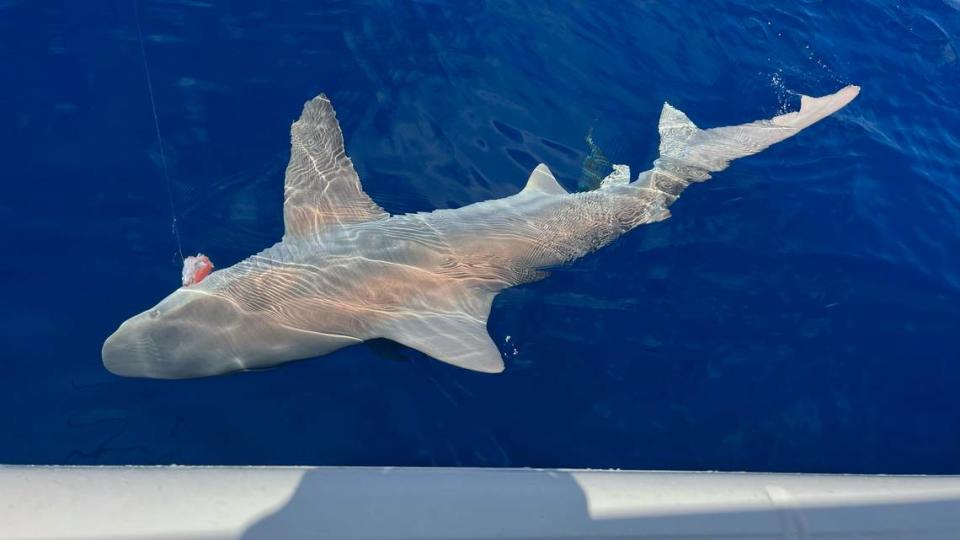Who’s stealing the catch from your fishing line? Shark theft on the rise in Florida
Imagine planning all week, hoping for a nice weather day to go offshore deep into the Gulf of Mexico.
You’ve put many hours of time and effort into making sure you’re ready for the rare opportunity when a nice weather day coincides with everyone’s schedules and the open season of fish you want to target.
You’ve used hundreds of dollars in gas, bait and tackle money before even wetting a line. As you pull up to your favorite spot that you’ve been dreaming about fishing since last year, you feel like it’s going to be a nice day.
Fish will be biting, the weatherman will be correct and beautiful blue waters of the Gulf of Mexico are about to yield their bounty.
The boat gets set up in position and the fish finder shows the honey hole is ready to produce. The first bait down hits the bottom and within seconds, it’s eaten. “Got one!” is said around the boat. A fight ensues and all the time and preparation are proving worthwhile. A few minutes go by and the battle is being won as the bottom dweller starts coming topside, until the tax man comes.
Something grabbed it. It’s now heading far away from the boat and you can’t stop it. Then the line breaks. Joy is turned to frustration. “Sharks!”
This scenario repeats again. And again. And again. One of those results in just the head of a large red snapper.
After four break-offs, you finally catch a legal red snapper that is 17 inches. The only reason you got it up is because it was smaller and you could horse it faster than the sharks could attack it. This is the reality that many Gulf anglers are facing on a daily basis when they can get offshore.
Shark problems are now prevalent across Florida and other areas. What used to be an isolated incident around bigger structures like reefs and wrecks is now almost every area of the Gulf. From tarpon fishing off the beaches, to snook on the flats all the way to the steps hundreds of miles in the Gulf, it has become far too often sharks taunt anglers.

At the beginning of June, on my first trip offshore we encountered sharks at two of our six spots. We were happy it wasn’t more.
When this occurs, the only option is generally to leave. If fish are biting, they are eaten by sharks which hover about halfway down to the bottom waiting for hooked fish to be presented in front of them. If fish aren’t biting, it’s usually a result of said sharks making fish feel unnerved.
By the end of June, we had days where 40 to 50 fish and baits were lost to sharks. Nine of the 10 spots had sharks on one trip. On one spot, our baits couldn’t even hit the bottom as sharks would eat them on the drop! We would move miles away only for the next one to be the same. And these spots, often small natural bottom areas, have slowly increased run-ins each year before now expanding to this magnitude. A shark encounter was more of an isolated incident and not an expectation.
All across social media, the shark problem is being voiced this summer.
“Grouper bite has been tough with the sharks,” said Captain Tyler in St. Pete.
“Lost lots of fish to sharks, including a wahoo,” Captain Dion in Sarasota said.
“They’re as bad as I’ve ever seen them,” explained Captain John Gunter of Palmetto. “Every spot. I’m not sure if they come to your boat when you start fishing or if there are just that many of them.”
With so many shark encounters happening with anglers, it is reaching a breaking point where something needs to be done. Hooking 40 fish to catch 10 is not sustainable and happens frequently.
Are released, out-of-season fish being eaten on their way back down upon release? More than likely, and it seems like a frustrating waste. Shark mortality is one of the leading methods of fish dying that anglers are experiencing.
And the biggest culprit is protected. Sandbar sharks, which seem to be the majority of the species caught, are to be released immediately when landed by anglers. But tiger sharks, hammerheads and more have been seen with increasing regularity.
With no shark fishery in place and protections for most shark species the problem is only going to get worse.


